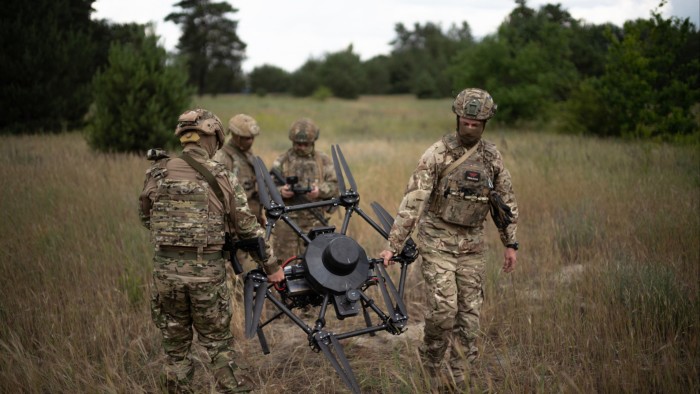This article is an on-site version of our Europe Express newsletter. Premium subscribers can sign up here to get the newsletter delivered every weekday and fortnightly on Saturday morning. Standard subscribers can upgrade to Premium here, or explore all FT newsletters
Good morning. News to start: The US is prepared to provide intelligence assets and battlefield oversight to any western defence force in postwar Ukraine and take part in a European-led air defence shield for the country, officials briefed on negotiations over the so-called security guarantees have told the Financial Times.
Today, I unpack what’s driving the White House’s apparent shift on protecting a potential peace deal in Ukraine, and explain why three of the EU’s most powerful leaders are taking a trip to Moldova.
Willing
The coalition of the willing to protect postwar Ukraine was formed in response to US President Donald Trump’s assertion that the US wanted no part in its activities. Almost six months later, the most prominent unwilling appears to be changing his tune.
Context: Ukraine has demanded security guarantees to protect it from any future aggression from Russia as part of a deal to end Moscow’s more than three-and-a-half year long war against the country.
US national security and defence officials have told European counterparts in recent days that America could commit intelligence, surveillance and reconnaissance assets, command and control structures and critical systems necessary to sustain Ukraine’s air security to western troops taking part in the security guarantees.
That’s a major shift in stance.
In March, France and the UK formed the “coalition”, vowing to explore options including deploying tens of thousands of troops on the ground, in air and sea policing missions, and ceasefire monitoring, to allow Ukraine’s armed forces to rebuild and form a “steel porcupine” that Russia would never again contemplate attacking.
The public show of support was aimed at reassuring Kyiv in the face of Trump’s refusal to join, but in private officials admitted that the Europeans couldn’t go it alone, and the US military needed to take part, at least in a supportive capacity.
Since then, the US president has shown signs of impatience with his Russian counterpart Vladimir Putin, and increasing bonhomie with Ukraine’s Volodymyr Zelenskyy.
Officials say Trump has also realised that his aim of achieving peace — and desire for the Nobel Peace Prize — requires some form of American input into ensuring that peace lasts. Europe’s promise to increase defence spending to 5 per cent of GDP has also bought the continent credit in the White House, they add.
Officials say a rough outline of the security guarantee pitch could come “soon”.
Much is left to be decided, not least which European countries will send how many troops into potential harm’s way, and whether Putin would even agree (thus far he’s said he will never accept western troops in Ukraine).
A peace deal is still elusive, and any decision to implement security guarantees a long way off. But European officials are cautiously optimistic that a key hurdle — Trump’s reticence to help — has been breached.
“President Trump and his national security team continue to engage with Russian and Ukrainian officials towards a bilateral meeting to stop the killing and end the war,” said a White House official. “It is not in the national interest to further negotiate these issues publicly.”
Chart du jour: Work-life balance
People in the Netherlands are quietly shifting towards a four-day work week, offering an apt case study of its benefits — and drawbacks, writes Sarah O’Connor.
Reinforcements
The leaders of France, Germany and Poland will today send a not-so-subtle message to Moldovan voters: Don’t let Russia derail your express train to European integration.
Context: Moldova’s parliamentary elections on September 28 are a referendum on the country’s pro-EU government and its bid to become a member of the bloc. Russia is providing financial, organisational and rhetorical support to opposition parties who oppose that ambition.
French President Emmanuel Macron, German Chancellor Friedrich Merz, and Polish Prime Minister Donald Tusk will join President Maia Sandu to mark Moldova’s Independence Day, including a mass public address at a concert in the capital, Chișinău.
The fiercely pro-European Sandu narrowly won re-election in November, just after seeing a referendum on EU accession pass with a razor-thin majority in the face of sustained Russian interference.
A former Soviet republic, Moldova is seen as a critical battleground for pro-western alignment in eastern Europe. It borders Ukraine and part of its territory in the region of Transnistria is occupied by pro-Russian separatists.
While condemning Russian meddling in Moldovan politics, which Moscow denies, Brussels and other EU capitals have sought to provide financial aid to Sandu’s government and rhetorical support to her pro-western ambitions, without overtly seeking to influence voters.
“Through their presence, European partners reaffirm their trust in the Republic of Moldova and their support for the country’s European path,” Sandu’s office said in a statement.
What to watch today
-
European leaders visit Moldova to celebrate the country’s independence day. Press statements from 1650pm.
-
EU Council president António Costa meets Belgian Prime Minister Bart De Wever.
Now read these
Recommended newsletters for you
Free Lunch — Your guide to the global economic policy debate. Sign up here
The State of Britain — Peter Foster’s guide to the UK’s economy, trade and investment in a changing world. Sign up here
Are you enjoying Europe Express? Sign up here to have it delivered straight to your inbox every workday at 7am CET and on Saturdays at noon CET. Do tell us what you think, we love to hear from you: [email protected]. Keep up with the latest European stories @FT Europe
